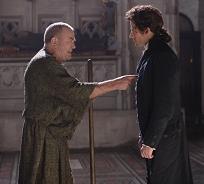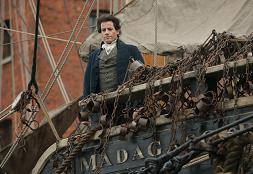
As a chronicle of those decades, “Amazing Grace” is the story of repeated, crushing failure. Its heroes are Hollywood’s traditional worst nightmare: intolerant, fanatical Christians who keep raving about religion and Won’t Settle Down. Refusing to tolerate the slave trade, scorning appeasement or phaseouts, Wilberforce’s team hammers complacent British society over and over and over. We see good men quarrel with each other, ruin their health, and almost despair over a cause that seems impossible to win. (We also see much shouting in Parliament, and plenty of elaborate 18th-century wigs.) What we don’t see–true to British history and true to many spiritual autobiographies–is a lot of success. At least, not for a long, long time.
The center of it all is Wilberforce himself, played by Ioan Gruffudd as an ecstatic nature-lover and God-worshipper who feeds beggars at his own table and jumps up in crowded rooms to sing a hymn (guess which one?). At first, it’s hard to believe a politician as saintly as Wilberforce actually existed. But a subsequent Wiki search confirms that, yes, Wilberforce really was that good–he was even a co-founder of the original Society for the Prevention of Cruelty to Animals. In fact, Wilberforce and his fellow evangelical, anti-slavery Parliamentarians were sniffily called the “Saints” by the other lawmakers.
The film begins several years into Wilberforce’s crusade, when he is broken with disappointment, dependent on an opiate, and about to give up: “I was chosen for this task and I failed,” he says. We see flashbacks about his initial hopes, and then the machinations of legislators who undermined him. Enter a Lovely Youth Thing who will restore his faith in himself and his cause. Unfortunately, actress Romola Garai is ill-cast and unpersuasive as Wilberforce’s love interest and future wife; she seems to view tête-à-têtes about slavery as opportunities for flirting and bosom-heaving.
More believable is Albert Finney’s excellent portrayal of John Newton, the former slave ship owner who penned “Amazing Grace.” Newton is that rarity on the silver screen: a passionate and outspoken Christian who doesn’t dabble in euphemisms: “I am a great sinner, and Christ is a great savior,” he famously declares when Wilberforce visits him at his church. It’s Newton who, according to the film if not history, encourages Wilberforce to begin his political work. Years later, as Wilberforce inches closer to his goal, Newton has gone blind. In one moving scene, Newton raises his sightless eyes and thanks God he now knows how wrong he was to traffic in humans: “I once was blind, but now I see. At last it’s true.”
Strangely, the film spends little time with these humans–the ones whose lives were at stake, the black men and women whom so few really saw in Wilberforce’s day. North African singer Youssou N’Dour has a quiet dignity and strength in the role of Oloudauh Equiano, a black abolitionist who wrote down his experiences as a slave and influenced many of the “Saints.” Mostly, however, the movie shows us white men talking in oak-paneled rooms.
Towards its end, the film downplays Wilberforce’s religiosity. Still, the power of his spirit comes through, and we can sense the weary thankfulness mingled with his joy when at last England’s slave trade is abolished. “When people speak of great men, rarely do they think of peace,” says one of his fellow lawmakers. Wilberforce is that brilliant and inspiring exception: a man who steadily, year after year, without violence and without fireworks, tried to stop a great evil. Rather than use lightning bolts, as one of the characters says, “God sometimes does his work with gentle drizzle.”
— Posted by Laura Sheahen


